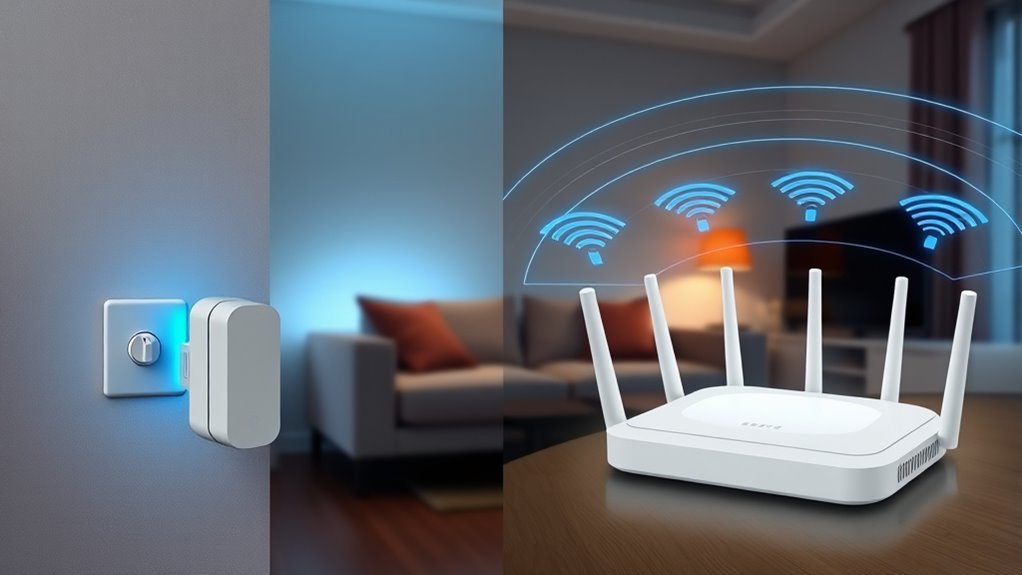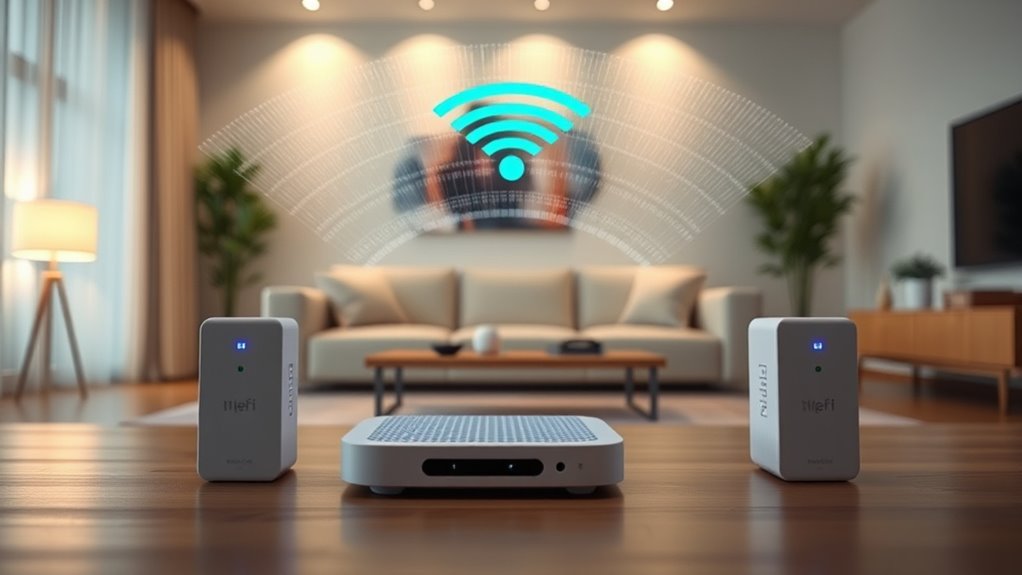If you’re comparing mesh networking and range extenders, mesh systems generally provide faster, more reliable speeds across your whole home. They use intelligent devices to maintain a seamless connection, preventing slowdowns and dead zones. Range extenders might seem easier or cheaper but often split bandwidth and cause delays. For a swift, stable network that supports high-demand devices, mesh is the better choice. Curiosity about the details? Keep exploring to discover how each option really performs.
Key Takeaways
- Mesh networks offer consistent speeds and higher performance across the entire home compared to extenders, which can reduce bandwidth.
- Range extenders may cause slower browsing due to signal splitting and potential network congestion.
- Mesh systems support high-demand devices seamlessly, maintaining speed even in large or complex layouts.
- Extenders often introduce latency and can disrupt stable data transmission, impacting overall speed.
- Advanced mesh technology ensures better speed stability and reliability for streaming, gaming, and heavy data use.

When it comes to expanding your home Wi-Fi coverage, choosing the right solution can make a significant difference in your internet experience. Two popular options are mesh networking and range extenders, each with its own strengths and drawbacks. As you evaluate these options, it’s crucial to consider not just speed and coverage but also security concerns and cost considerations. Your choice impacts not only how smoothly your devices connect but also how safe your network remains.
Mesh networking systems are designed to provide seamless, unified coverage throughout your home. Instead of having multiple disconnected access points, you get a single network name that intelligently directs your devices to the strongest connection. This setup minimizes dead zones and simplifies management. However, the higher cost of mesh systems is a common concern. They tend to be more expensive upfront, often costing hundreds of dollars for a complete setup. Despite the initial investment, many find that the improved coverage and reliability justify the expense. When it comes to security, mesh networks typically offer advanced features like automatic firmware updates, encrypted connections, and robust security protocols built into the system. This means your network is generally more protected against cyber threats, which is especially important if you handle sensitive data or have multiple smart devices connected.
Mesh systems offer seamless coverage, stronger security features, and better reliability despite higher upfront costs.
Range extenders, on the other hand, are usually more budget-friendly and easier to install. They work by amplifying your existing Wi-Fi signal and rebroadcasting it to extend coverage. But, this simplicity comes with some trade-offs. For starters, they often create separate networks or require manual switching between networks, which can disrupt your browsing experience. Speed can also take a hit because range extenders typically split the bandwidth between your device and the main router. Security concerns with extenders are valid—since they often operate as separate networks, they may lack the same level of encryption or security features found in mesh systems. If you don’t configure them correctly, they can introduce vulnerabilities into your home network. Additionally, research shows that advanced Wi-Fi technologies like mesh systems can significantly enhance your network’s security and performance compared to traditional extenders.
Ultimately, your choice hinges on your priorities. If you want a seamless, secure, and high-speed experience and are willing to invest more, a mesh system is likely your best bet. But if you’re on a tight budget and need a quick fix for a specific dead zone, a range extender may suffice. Keep in mind that while cost considerations are important, security shouldn’t be overlooked. A poorly secured extender can be an entry point for cyber threats. Thus, weigh your options carefully, balancing your budget with the security and performance needs of your home network.
Frequently Asked Questions
Can Mesh Networks Support Multiple Devices Simultaneously Without Slowdown?
You might wonder if a mesh network can handle multiple devices without slowdown. The good news is, yes, mesh networks support device compatibility and network scalability, allowing many devices to connect seamlessly. They intelligently route data, preventing congestion and maintaining speeds even as you add more gadgets. So, you’ll experience smooth performance, whether you’re streaming, gaming, or working, making mesh networks a reliable choice for growing households or busy offices.
Do Range Extenders Reduce Overall Network Latency?
Think of your network as a busy highway. Range extenders act like relay stations, but they can sometimes get caught in traffic jams caused by wireless interference, leading to increased latency. While they boost signal strength, they might compromise signal stability, causing delays. So, yes, range extenders can reduce overall network latency if they’re well-placed, but in busy wireless environments, interference can still slow things down.
Are Mesh Networks Easier to Set up Than Range Extenders?
Setting up a mesh network is generally easier than installing range extenders because it offers better network flexibility and seamless device compatibility. With a mesh system, you just connect the main hub and add nodes, which automatically sync. Range extenders often require manual configuration and may cause compatibility issues, making them trickier to set up. Overall, mesh networks provide a more straightforward, user-friendly experience for expanding your Wi-Fi coverage.
Which Option Offers Better Security Features?
You’ll find that mesh networks generally offer better security features than range extenders. They often include robust wireless encryption protocols to protect your data and receive regular firmware updates to patch vulnerabilities. Range extenders may lack these advanced security options or update support, making your network more vulnerable. If security is your priority, mesh systems provide stronger, more consistent protection through enhanced encryption and ongoing firmware improvements.
How Do Costs Compare Between Mesh Systems and Range Extenders?
When comparing costs, you’ll find mesh systems tend to be pricier upfront due to installation complexity and advanced features, but they often offer better device compatibility and seamless coverage. Range extenders are usually cheaper and easier to set up, making them ideal for smaller budgets. However, they might require more maintenance and can sometimes cause compatibility issues. Your choice depends on your budget and how much you value easy installation and reliable performance.
Conclusion
In the battle of mesh networking versus range extenders, think of mesh as your Wi-Fi’s loyal flock, seamlessly soaring across your home, while extenders are more like helpful bridges trying to span the distance. If you crave smooth, lightning-fast connections everywhere, mesh is your trusty wingman, turning a patchy signal into a well-orchestrated symphony. So, choose wisely—because your internet should feel like a smooth highway, not a bumpy backroad.









